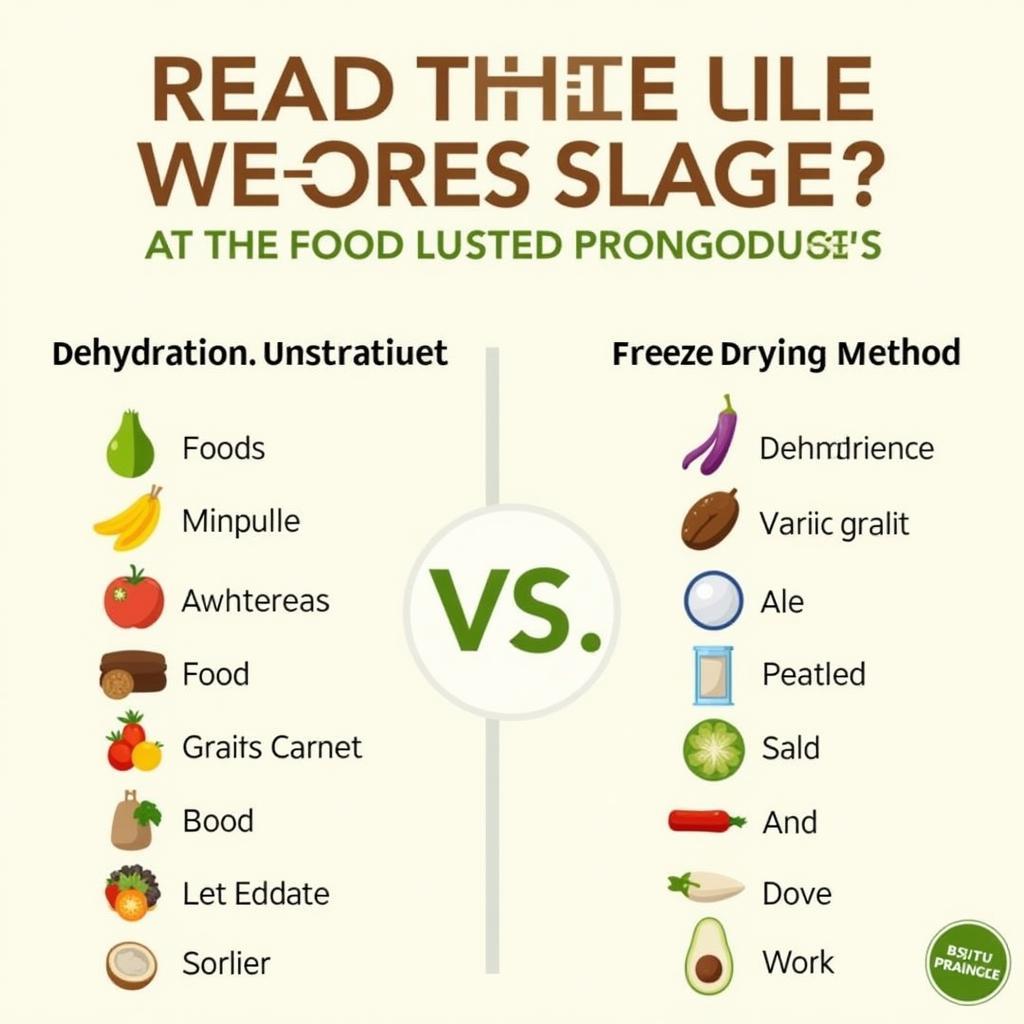Dehydrated Food Vs Freeze Dried – which method comes out on top? This age-old question is often debated by hikers, campers, preppers, and anyone interested in preserving food for long periods. Both methods remove water, inhibiting microbial growth and extending shelf life, but they do so in different ways, leading to distinct differences in the final product. Let’s delve into the nuances of dehydrated food vs freeze dried to help you choose the best method for your needs.
Understanding Dehydration
Dehydration, the older of the two methods, involves removing moisture from food through low heat. Think of sun-drying tomatoes or herbs—that’s dehydration in its simplest form. Modern dehydrators use controlled temperatures and airflow to expedite the process, but the principle remains the same. This process results in a significant reduction in weight and volume, making dehydrated food ideal for backpacking. However, the heat used in dehydration can impact the nutritional value and flavor of some foods.
What are the advantages of dehydrated food? Its affordability and ease of use make it an accessible preservation option. Dehydrators are relatively inexpensive, and the process is straightforward. You can even dehydrate some foods in your oven!
Exploring Freeze Drying
Freeze drying, a more recent innovation, is a more complex process. It involves freezing the food solid, then lowering the pressure and adding heat to allow the frozen water to sublimate—transform directly from ice to vapor. This process preserves the food’s original shape, texture, and nutritional value better than dehydration. freeze dried food vs dehydrated can retain more of their original flavor, making them a popular choice for more delicate items like fruits and vegetables.
What about the downsides? Freeze drying equipment is significantly more expensive than dehydrators, making it less accessible for home use. The process is also more time-consuming.
Dehydrated Food vs Freeze Dried: A Head-to-Head Comparison
So, how do they truly stack up? The following table provides a concise overview of the key differences:
| Feature | Dehydrated | Freeze Dried |
|---|---|---|
| Process | Removes water through low heat | Freezes food, then sublimates ice under low pressure |
| Cost | Lower | Higher |
| Time | Shorter | Longer |
| Nutritional Value | Some nutrient loss | Retains most nutrients |
| Flavor | Noticeable flavor change | Retains more original flavor |
| Texture | Chewy, leathery | Crisp, airy |
| Shelf Life | Long (months to years) | Very long (up to 25 years) |
| Weight & Volume | Significant reduction | Minimal reduction |
 Shelf Life Comparison: Dehydrated vs Freeze Dried Foods
Shelf Life Comparison: Dehydrated vs Freeze Dried Foods
Dr. Amelia Carter, a food scientist specializing in preservation techniques, notes, “Freeze drying is the gold standard for preserving nutrient density and flavor, especially for delicate items like fruits.”
Which Method Is Right for You?
Choosing between dehydrated vs freeze dried food ultimately depends on your priorities. If affordability and reduced weight and volume are paramount, dehydration is a good choice. If preserving nutritional value and flavor is your focus, freeze drying is the better option, especially for things like freeze dried food vs dehydrated food.
Conclusion
Dehydrated food vs freeze dried—both are effective methods for preserving food, each with its own advantages and disadvantages. By understanding these differences, you can choose the preservation method that best suits your needs and culinary goals. Whether you’re a backpacker looking for lightweight meal options or a gourmet seeking to preserve the peak flavor of your garden harvest, there’s a perfect preservation method waiting for you.
FAQ
- Is freeze-dried food healthy? Yes, freeze-dried food retains most of its nutritional value.
- How do you rehydrate dehydrated food? Soak in hot water for 10-15 minutes.
- How long does freeze-dried food last? Up to 25 years if stored properly.
- Can you freeze-dry meat? Yes, but it’s a more complex process.
- Is dehydrated food safe to eat? Yes, as long as it’s been dehydrated and stored correctly.
- What are some popular freeze-dried meals? Camping meals, astronaut food for sale, and emergency food supplies.
- What is the best way to store dehydrated food? In airtight containers in a cool, dry place.
Looking for specific advice on pet food? Check out our article on dehydrated vs freeze dried dog food.
Need assistance? Contact us at Phone Number: 02437655121, Email: [email protected] Or visit us at: 3PGH+8R9, ĐT70A, thôn Trung, Bắc Từ Liêm, Hà Nội, Việt Nam. We have a 24/7 customer support team.